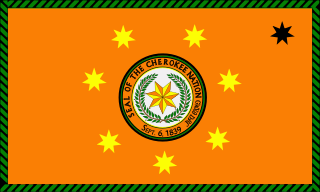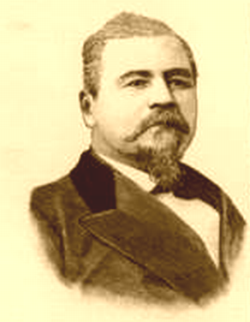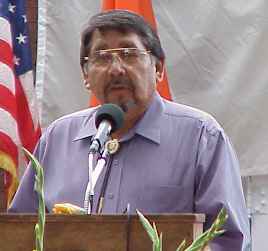
Tommy Wildcat (born May 3, 1967) is a Native American musician and academic. [1]

Tommy Wildcat (born May 3, 1967) is a Native American musician and academic. [1]
Cherokee Nation National Treasure Tommy Wildcat is an enrolled citizen of the Cherokee Nation, Tulsa Indian Alliance Lifetime Cultural Achievement Award Recipient, NAMA - Native American Music Award Flutist of the Year 2002. [2] [3] His parents are Annie and the late Tom Webber Wildcat Both are Cherokee National Treasures He also has a twin sister named Tammy. [4] Tommy graduated from Sequoyah High School 1985, and he is a 2014 graduate of Northeastern State University in Tahlequah, Oklahoma. His Bachelor's Degree included a Major in Cherokee Cultural Studies and a Minor in American Indian Studies. His family appeared in National Geographic magazine's September 2005 issue, where one photo showed Tommy holding his young nephew, Skylar Wildcat. [5] His father Tom Wildcat was designated a Cherokee National Treasure in 1995 for his skill in making turtle shell shakers, Mother Annie Wildcat was Bestowed a Cherokee National Treasure in 2018 for Clay Bead Necklaces.[ citation needed ] Tommy was featured in the American Express commercial Charge Against Hunger 1995, which aired during the Beatles Anthology. [6] [7]

A self-taught composer of flute songs, Tommy has learned traditional vocal songs of his tribe from his father, Tom W. Wildcat. [8]
Tommy Wildcat's company, A Warrior's Production, has produced four full-length albums. His first was released in 1995, [9] including Tom Richard's The Real Outdoors on the Nashville Network. [10]

Acworth is a city in Cobb County, Georgia, United States. It is part of the Atlanta metropolitan area. As of the 2020 census, this city had a population of 22,440, up from 20,425 in 2010. Acworth is located in the foothills of the North Georgia mountains along the southeastern banks of Lake Acworth and Lake Allatoona on the Etowah River. Unincorporated areas known as Acworth extend into Bartow, Cherokee and Paulding counties.

Park Hill is an unincorporated community and census-designated place (CDP) in southwestern Cherokee County, Oklahoma, United States. The population was 3,909 at the 2010 census. It lies near Tahlequah, east of the junction of U.S. Route 62 and State Highway 82.

Tahlequah is a city in Cherokee County, Oklahoma located at the foothills of the Ozark Mountains. It is part of the Green Country region of Oklahoma and was established as a capital of the 19th-century Cherokee Nation in 1839, as part of the new settlement in Indian Territory after the Cherokee Native Americans were forced west from the American Southeast on the Trail of Tears.

The United Keetoowah Band of Cherokee Indians in Oklahoma is a federally recognized tribe of Cherokee Native Americans headquartered in Tahlequah, Oklahoma. According to the UKB website, its members are mostly descendants of "Old Settlers" or "Western Cherokee," those Cherokee who migrated from the Southeast to present-day Arkansas and Oklahoma around 1817. Some reports estimate that Old Settlers began migrating west by 1800. This was before the forced relocation of Cherokee by the United States in the late 1830s under the Indian Removal Act.
Jesse Bartley Milam (1884–1949) was best known as the first Principal Chief of the Cherokee Nation appointed by a U.S. president since tribal government had been dissolved before Oklahoma Statehood in 1907. He was appointed by President Franklin D. Roosevelt in 1941, who reappointed him in 1942 and 1943; he was reappointed by President Harry S. Truman in 1948. He died while in office in 1949.

The Cherokee Nation, also known as the Cherokee Nation of Oklahoma, is the largest of three Cherokee federally recognized tribes in the United States. It includes people descended from members of the Old Cherokee Nation who relocated, due to increasing pressure, from the Southeast to Indian Territory and Cherokee who were forced to relocate on the Trail of Tears. The tribe also includes descendants of Cherokee Freedmen, Absentee Shawnee, and Natchez Nation. As of 2023, over 450,000 people were enrolled in the Cherokee Nation.
Jay Red Eagle is a Native American flautist and Native American artist whose businesses include lines of music clothing called Nashville Threads and M.T. Medicine Bottle. His clothing and shoe designs include country music and Native American clothing, Hip hop clothing, and the first ever Cherokee shoes specifically designed using the Cherokee syllabary and language. He is an enrolled member of the Cherokee Nation. His debut CD was entitled Vision. He was born in Tahlequah, Oklahoma, and in 2010 he released a second CD titled Cherokee Nation which is also composed of Native American flute music.
Sequoyah High School is a Native American boarding school serving students in grades 7 through 12, who are members of a federally recognized Native American tribe. The school is located in Park Hill, Oklahoma, with a Tahlequah post office address, and is a Bureau of Indian Education (BIE) grant school operated by the Cherokee Nation.
Talmadge Davis (1962–2005) was a Cherokee artist, who explored historical and military themes in his highly naturalistic paintings.

Dennis Wolf Bushyhead was a leader in the Cherokee Nation after they had removed to Indian Territory. Born into the Wolf Clan, he was elected as Principal Chief, serving two terms, from 1879 to 1887.

Martha Berry is a Cherokee beadwork artist, who has been highly influential in reviving traditional Cherokee and Southeastern beadwork, particularly techniques from the pre-Removal period. She has been recognized as a Cherokee National Treasure and is the recipient of the Seven Star Award and the Tradition Bearer Award. Her work is shown in museums around the United States.
Barbara McAlister is an internationally acclaimed mezzo-soprano Native American opera singer from Muskogee, Oklahoma.
Louis E. Davis was an American architect who designed homes and public buildings in Honolulu, Hawaii. During the 1920s, he was involved in laying out the new King Street campus of President William McKinley High School and designing its buildings in a Spanish Colonial Revival style. He employed a similar style in designing the 1931 Honolulu Police Station on Merchant Street, which harmonized well with that of the new city hall, Honolulu Hale. Both the old McKinley campus quadrangle and the Merchant Street Historic District are on the National Register of Historic Places.

Hastings Shade was a former deputy chief of the Cherokee Nation. He was a traditionalist, artist, and master level fluent speaker of the Cherokee language.

The Cherokee Nation was a legal, autonomous, tribal government in North America recognized from 1794 to 1907. It was often referred to simply as "The Nation" by its inhabitants. The government was effectively disbanded in 1907, after its land rights had been extinguished, prior to the admission of Oklahoma as a state. During the late 20th century, the Cherokee people reorganized, instituting a government with sovereign jurisdiction known as the Cherokee Nation. On July 9, 2020, the United States Supreme Court ruled that the Muscogee (Creek) Nation had never been disestablished in the years before allotment and Oklahoma Statehood.
Lena Blackbird is a Cherokee artist living in Tahlequah, Oklahoma. She is best known for her Cherokee double-walled basket weaving. She was the first of the Cherokee basket makers to decorate the tops of her baskets and incorporate vases within her baskets. Blackbird's customary artist mark is seen in a chain pattern on the top of her baskets.

Durbin Feeling was a Cherokee Nation linguist who wrote the primary Cherokee–English dictionary in 1975. He is considered the greatest modern contributor to the preservation of the endangered Cherokee language.

Cherokee National Treasure is a distinction created in 1988 by the Cherokee Nation to recognize people who have made significant contributions to the preservation of the tribe's art, language, and culture.
Bill Glass Jr. is a Cherokee Nation ceramic artist, sculptor, and public artist, who was named a Cherokee National Treasure in 2009.